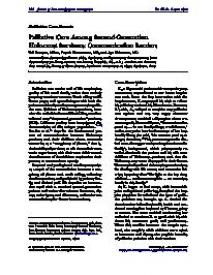Palliative Care Among Second-Generation Holocaust Survivors : Communication Barriers
Palliative care at the end of life emphasizes quality of life until death, rather than actively pursuing curative treatment. Truth telling at different stages and open dialogue with both the patient and family are key components in palliative care. Children of Holocaust survivors, born after the end of the SecondWorldWar, are often referred to as ‘‘the second-generation’’ survivors (SGS). Different studies have investigated the characteristics of this unique population.1e12 Bar-On et al.13 describe the fundamental pattern of communication between Holocaust survivors and their children about traumatic memories as a ‘‘conspiracy of silence,’’ that is, the inability of survivors to talk about their traumatic experiences with their own children and the reluctance of the children to stimulate their parents to communicate openly. Personal and professional conflicts may arise as a result of the contradiction between a conspiracy of silence and truth telling, reflecting the diverse values and goals held by patient, family, and clinical staff. We describe an intervention used with a terminal second-generation patient and review the relevant literature, discuss main issues and dilemmas, and make recommendations for future interventions.
Geachte bezoeker,
De informatie die u nu opvraagt, kan door psychotraumanet niet aan u worden getoond. Dit kan verschillende redenen hebben,
waarvan (bescherming van het) auteursrecht de meeste voorkomende is. Wanneer het mogelijk is om u door te verwijzen naar de bron
van deze informatie, dan ziet u hier onder een link naar die plek.
Als er geen link staat, kunt u contact opnemen met de bibliotheek,
die u verder op weg kan helpen.
Met vriendelijke groet,
Het psychotraumanet-team.
In: Journal of Pain and Symptom Management ISSN: 0885-3924 | 15 | 4 | 798-802
https://www.jpsmjournal.com/article/S0885-3924(12)00247-3/fulltext


